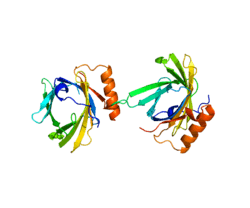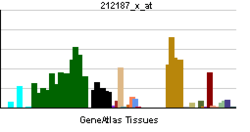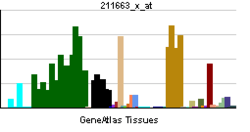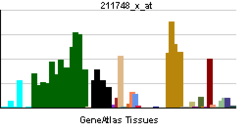Prostaglandin D2 synthase
| Prostaglandin D2 synthase 21kDa (brain) |
|---|
|

|
| Available structures |
| PDB |
Ortholog search: PDBe, RCSB |
| List of PDB id codes |
|
2WWP, 3O19, 3O22, 3O2Y, 4IMN, 4IMO, 4ORR, 4ORS, 4ORU, 4ORW, 4ORX, 4ORY, 4OS0, 4OS3, 4OS8
|
|
|
| Identifiers |
|---|
| Symbols |
PTGDS ; L-PGDS; LPGDS; PDS; PGD2; PGDS; PGDS2 |
|---|
| External IDs |
OMIM: 176803 MGI: 99261 HomoloGene: 737 GeneCards: PTGDS Gene |
|---|
| EC number |
5.3.99.2 |
|---|
|
|
| RNA expression pattern |
|---|
|
|
|
|
|
|
|
More reference expression data |
| Orthologs |
|---|
| Species |
Human |
Mouse |
|---|
| Entrez |
5730 |
19215 |
|---|
| Ensembl |
ENSG00000107317 |
ENSMUSG00000015090 |
|---|
| UniProt |
P41222 |
O09114 |
|---|
| RefSeq (mRNA) |
NM_000954 |
NM_008963 |
|---|
| RefSeq (protein) |
NP_000945 |
NP_032989 |
|---|
| Location (UCSC) |
Chr 9:
136.98 – 136.99 Mb |
Chr 2:
25.47 – 25.47 Mb |
|---|
| PubMed search |
|
|
|---|
|
Prostaglandin-H2 D-isomerase (PTGDS) is an enzyme that in humans is encoded by the PTGDS gene.[1][2]
Function
The protein encoded by this gene is a glutathione-independent prostaglandin D synthase that catalyzes the conversion of prostaglandin H2 (PGH2) to prostaglandin D2 (PGD2). PGD2 functions as a neuromodulator as well as a trophic factor in the central nervous system. PGD2 is also involved in smooth muscle contraction/relaxation and is a potent inhibitor of platelet aggregation. This gene is preferentially expressed in brain. Studies with transgenic mice over-expressing this gene suggest that this gene may be also involved in the regulation of non-rapid eye movement sleep.[2] Furthermore, PTGDS and its product PGD2 are elevated in the bald-scalp areas of men with male pattern baldness (androgenetic alopecia).[3]
Clinical use
Prostaglandin D2 synthase is used clinically as a diagnostic marker for liquorrhea, that is, to check whether fluid leaking from the nose or ear contains cerebrospinal fluid.[4] This is important in the assessment of head trauma severity. In a medical context, the older term "β-trace protein" is frequently used to refer to PTGDS.
See also
References
- ↑ Nagata A, Suzuki Y, Igarashi M, Eguchi N, Toh H, Urade Y, Hayaishi O (May 1991). "Human brain prostaglandin D synthase has been evolutionarily differentiated from lipophilic-ligand carrier proteins". Proceedings of the National Academy of Sciences of the United States of America 88 (9): 4020–4. doi:10.1073/pnas.88.9.4020. PMC 51585. PMID 1902577.
- 1 2 "Entrez Gene: PTGDS prostaglandin D2 synthase 21kDa (brain)".
- ↑ Garza LA, Liu Y, Yang Z, Alagesan B, Lawson JA, Norberg SM, Loy DE, Zhao T, Blatt HB, Stanton DC, Carrasco L, Ahluwalia G, Fischer SM, FitzGerald GA, Cotsarelis G (Mar 2012). "Prostaglandin D2 inhibits hair growth and is elevated in bald scalp of men with androgenetic alopecia". Science Translational Medicine 4 (126): 126ra34. doi:10.1126/scitranslmed.3003122. PMC 3319975. PMID 22440736.
- ↑ Bachmann G, Petereit H, Djenabi U, Michel O (Mar 2002). "Predictive values of beta-trace protein (prostaglandin D synthase) by use of laser-nephelometry assay for the identification of cerebrospinal fluid". Neurosurgery 50 (3): 571–6; discussion 576–7. doi:10.1227/00006123-200203000-00027. PMID 11841726.
Further reading
- White DM, Mikol DD, Espinosa R, Weimer B, Le Beau MM, Stefansson K (Nov 1992). "Structure and chromosomal localization of the human gene for a brain form of prostaglandin D2 synthase". The Journal of Biological Chemistry 267 (32): 23202–8. PMID 1385416.
- Kuruvilla AP, Hochwald GM, Ghiso J, Castaño EM, Pizzolato M, Frangione B (Nov 1991). "Isolation and amino terminal sequence of beta-trace, a novel protein from human cerebrospinal fluid". Brain Research 565 (2): 337–40. doi:10.1016/0006-8993(91)91666-O. PMID 1726844.
- Zahn M, Mäder M, Schmidt B, Bollensen E, Felgenhauer K (May 1993). "Purification and N-terminal sequence of beta-trace, a protein abundant in human cerebrospinal fluid". Neuroscience Letters 154 (1-2): 93–5. doi:10.1016/0304-3940(93)90179-O. PMID 7689714.
- Harrington MG, Aebersold R, Martin BM, Merril CR, Hood L (1993). "Identification of a brain-specific human cerebrospinal fluid glycoprotein, beta-trace protein". Applied and Theoretical Electrophoresis 3 (5): 229–34. PMID 7692978.
- Bastien L, Sawyer N, Grygorczyk R, Metters KM, Adam M (Apr 1994). "Cloning, functional expression, and characterization of the human prostaglandin E2 receptor EP2 subtype". The Journal of Biological Chemistry 269 (16): 11873–7. PMID 8163486.
- Funk CD, Furci L, FitzGerald GA, Grygorczyk R, Rochette C, Bayne MA, Abramovitz M, Adam M, Metters KM (Dec 1993). "Cloning and expression of a cDNA for the human prostaglandin E receptor EP1 subtype". The Journal of Biological Chemistry 268 (35): 26767–72. PMID 8253813.
- Abramovitz M, Boie Y, Nguyen T, Rushmore TH, Bayne MA, Metters KM, Slipetz DM, Grygorczyk R (Jan 1994). "Cloning and expression of a cDNA for the human prostanoid FP receptor". The Journal of Biological Chemistry 269 (4): 2632–6. PMID 8300593.
- Hoffmann A, Conradt HS, Gross G, Nimtz M, Lottspeich F, Wurster U (Aug 1993). "Purification and chemical characterization of beta-trace protein from human cerebrospinal fluid: its identification as prostaglandin D synthase". Journal of Neurochemistry 61 (2): 451–6. doi:10.1111/j.1471-4159.1993.tb02145.x. PMID 8336134.
- Leone MG, Saso L, Del Vecchio A, Mo MY, Silvestrini B, Cheng CY (Aug 1993). "Micropurification of two human cerebrospinal fluid proteins by high performance electrophoresis chromatography". Journal of Neurochemistry 61 (2): 533–40. doi:10.1111/j.1471-4159.1993.tb02156.x. PMID 8336140.
- Giacomelli S, Leone MG, Grima J, Silvestrini B, Cheng CY (Feb 1996). "Astrocytes synthesize and secrete prostaglandin D synthetase in vitro". Biochimica Et Biophysica Acta 1310 (3): 269–76. doi:10.1016/0167-4889(95)00182-4. PMID 8599604.
- Blödorn B, Mäder M, Urade Y, Hayaishi O, Felgenhauer K, Brück W (May 1996). "Choroid plexus: the major site of mRNA expression for the beta-trace protein (prostaglandin D synthase) in human brain". Neuroscience Letters 209 (2): 117–20. doi:10.1016/0304-3940(96)12614-8. PMID 8761996.
- Bonaldo MF, Lennon G, Soares MB (Sep 1996). "Normalization and subtraction: two approaches to facilitate gene discovery". Genome Research 6 (9): 791–806. doi:10.1101/gr.6.9.791. PMID 8889548.
- Yamashima T, Sakuda K, Tohma Y, Yamashita J, Oda H, Irikura D, Eguchi N, Beuckmann CT, Kanaoka Y, Urade Y, Hayaishi O (Apr 1997). "Prostaglandin D synthase (beta-trace) in human arachnoid and meningioma cells: roles as a cell marker or in cerebrospinal fluid absorption, tumorigenesis, and calcification process". The Journal of Neuroscience 17 (7): 2376–82. PMID 9065498.
- White DM, Takeda T, DeGroot LJ, Stefansson K, Arnason BG (May 1997). "Beta-trace gene expression is regulated by a core promoter and a distal thyroid hormone response element". The Journal of Biological Chemistry 272 (22): 14387–93. doi:10.1074/jbc.272.22.14387. PMID 9162076.
- Eguchi Y, Eguchi N, Oda H, Seiki K, Kijima Y, Matsu-ura Y, Urade Y, Hayaishi O (Dec 1997). "Expression of lipocalin-type prostaglandin D synthase (beta-trace) in human heart and its accumulation in the coronary circulation of angina patients". Proceedings of the National Academy of Sciences of the United States of America 94 (26): 14689–94. doi:10.1073/pnas.94.26.14689. PMC 25094. PMID 9405674.
- Tokugawa Y, Kunishige I, Kubota Y, Shimoya K, Nobunaga T, Kimura T, Saji F, Murata Y, Eguchi N, Oda H, Urade Y, Hayaishi O (Feb 1998). "Lipocalin-type prostaglandin D synthase in human male reproductive organs and seminal plasma". Biology of Reproduction 58 (2): 600–7. doi:10.1095/biolreprod58.2.600. PMID 9475419.
- Saso L, Leone MG, Sorrentino C, Giacomelli S, Silvestrini B, Grima J, Li JC, Samy E, Mruk D, Cheng CY (Nov 1998). "Quantification of prostaglandin D synthetase in cerebrospinal fluid: a potential marker for brain tumor". Biochemistry and Molecular Biology International 46 (4): 643–56. doi:10.1080/15216549800204172. PMID 9844724.
- Blödorn B, Brück W, Tumani H, Michel U, Rieckmann P, Althans N, Mäder M (Sep 1999). "Expression of the beta-trace protein in human pachymeninx as revealed by in situ hybridization and immunocytochemistry". Journal of Neuroscience Research 57 (5): 730–4. doi:10.1002/(SICI)1097-4547(19990901)57:5<730::AID-JNR14>3.0.CO;2-7. PMID 10462696.
- Pinzar E, Kanaoka Y, Inui T, Eguchi N, Urade Y, Hayaishi O (Apr 2000). "Prostaglandin D synthase gene is involved in the regulation of non-rapid eye movement sleep". Proceedings of the National Academy of Sciences of the United States of America 97 (9): 4903–7. doi:10.1073/pnas.090093997. PMC 18330. PMID 10781097.
|
|---|
| Receptor
(ligands) | | DP (D2) | | |
|---|
| |
- Antagonists: ADC-3680
- AZD-1981
- Bay U3405
- Fevipiprant
- MK-1029
- MK-7246
- OC-459
- OC000459
- QAV-680
- Ramatroban
- Setipiprant
- TM30089
- Vidupiprant
|
|---|
|
|---|
| | EP (E2) | |
- Antagonists: AH-6809
- ONO-8130
- SC-19220
- SC-51089
- SC-51322
|
|---|
| |
- Antagonists: AH-6809
- PF-04418948
- TG 4-155
|
|---|
| | |
|---|
| |
- Antagonists: GW-627368
- L-161982
- ONO-AE3-208
|
|---|
| Unsorted | |
|---|
|
|---|
| | FP (F2α) | |
|---|
| | IP (I2) | |
|---|
| | TP (TXA2) | |
|---|
| | Unsorted |
- Arbaprostil
- Ataprost
- Ciprostene
- Clinprost
- Cobiprostone
- Delprostenate
- Deprostil
- Dimoxaprost
- Doxaprost
- Ecraprost
- Eganoprost
- Enisoprost
- Eptaloprost
- Esuberaprost
- Etiproston
- Fenprostalene
- Flunoprost
- Froxiprost
- Lanproston
- Limaprost
- Luprostiol
- Meteneprost
- Mexiprostil
- Naxaprostene
- Nileprost
- Nocloprost
- Ornoprostil
- Oxoprostol
- Penprostene
- Pimilprost
- Piriprost
- Posaraprost
- Prostalene
- Rioprostil
- Rivenprost
- Rosaprostol
- Spiriprostil
- Tiaprost
- Tilsuprost
- Tiprostanide
- Trimoprostil
- Viprostol
|
|---|
|
|---|
| Enzyme
(inhibitors) | |
|---|
| | Others | |
|---|
| See also: Leukotrienergics |
|



